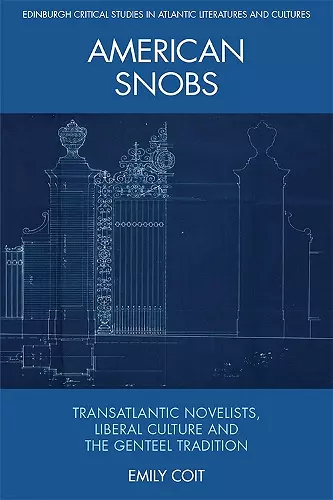American Snobs
Transatlantic Novelists, Liberal Culture and the Genteel Tradition
Format:Paperback
Publisher:Edinburgh University Press
Published:28th Nov '22
Should be back in stock very soon

Reassesses American elitisms of the late nineteenth and early twentieth century Arguing that Henry Adams, Henry James and Edith Wharton articulated their political thought in response to the liberalism that reigned in Boston and, more specifically, at Harvard University, this book shows how each of these authors interrogated that liberalism's arguments for education, democracy and the political duties of the cultivated elite. Coit shows that the works of these authors contributed to a realist critique of a liberal New England idealism that fed into the narrative about 'the genteel tradition', which shaped the study of US literature during the twentieth century.
Coit’s book traces stories, collapses oppositions, catalogs shifting meanings of words, differentiates, contrasts, disambiguates. It thrives on conversation about broad theoretical questions, it dives into archival work through which it uncovers natural connections that have gone largely unnoticed. At the same time, its argumentation remains remarkably linear and articulate, even when most elaborate. In other words, it presents an academic practice that is not only theoretically sophisticated, widely read and informed, but also clearly articulated... [A] New Americanist enterprise at its best. -- Ágnes Zsófia Kovács * The Henry James Review *
Erudite, eloquent, and occasionally witty, Coit’s reading of these figures against a broad intellectual history of liberalism and its manifestations in and around Harvard University is gripping if also disturbing. -- Stephanie Palmer, Nottingham Trent University * ALH *
This first monograph by Emily Coit applies thorough critical scholarship and deep knowledge of late nineteenth and early twentieth-century intellectual history to fashion a convincing argument about the attitudes toward American liberal democracy held by Henry Adams, Henry James, and Edith Wharton. [...] For literary critics and historians, the material that traces how interpretations of the genteel tradition were developed and manipulated in the twentieth century is both original and persuasive. Wharton scholars will have much to absorb from the monograph's varied contextual and comparative elements. -- William Blazek, Liverpool Hope University * Edith Wharton Review *
This book breathes new life into the study of a set of ideas and authors, all of which are rich in their own right and illuminating for what they tell us about the period. Coit’s easy, writerly hand, her skilled close readings and her fluid movement between political context, literary history and detailed analysis are impressive. * Lloyd Pratt, University of Oxford *
Emily Coit’s timely and ambitious American Snobs, profoundly informed by the politically charged concerns and insights of our embattled present as well as by exhaustive, fascinating scholarship, is a serious, unignorably challenging contribution to the American history of ‘whiteness’, discerning a radical (abolitionist, feminist, anti-racist) edge to liberal figures in the ‘genteel tradition’ ironically treated by James, Adams and Wharton and too often unreflectively disparaged since. Through her careful excavation of historical nuances and untangling of alignments and oppositions, recovering the various significances at the time of public intellectuals like Charles Eliot Norton, Barrett Wendell and Edwin L. Godkin, this provocative reframing poses serious questions to those who wish to recruit her triumvirate of major authors in any straightforward way for the causes of twenty-first-century democratic progress and casts new light on their still-influential achievements. * Philip Horne, University College London *
American Snobs is a helpful guidebook to a specific time and place, acquainting the reader with the push and pull between aristocracy and democracy within a group that sees itself as an intellectual aristocracy... I recommend American Snobs to anyone with an interest in late nineteenth-century literature or in the current debates rocking academia. -- Nadia-Terese Laguna Franks * U.S. Studies Online *
ISBN: 9781474475419
Dimensions: unknown
Weight: unknown
328 pages